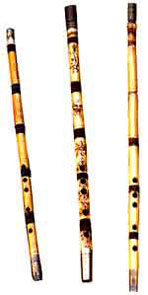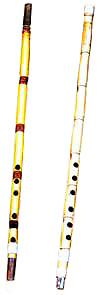 |
Ney
The
State
Museum of
Azerbaijani
Musical Culture.
1968 |
The
ney is one of the most ancient musical instruments.
Various types of neys were widespread among the peoples
of the Middle East and other countries. There were
several types of neys in Azerbaijan.
Fuzuli described the ney's sound as plaintive:
Because of love, I always moan like a ney
I won't stop moaning even
If I am cut into pieces like a ney.
The
great scientist and musicologist Abdulgadir Maraghayi
(14th-15th centuries) wrote in his work "Magasid
al-Alhan" about two types of ney-the agh ney
(white ney) and the gara ney (black ney), which were
widespread in those times.8 The fine-timbred ney used
to be a wonderful part of Azerbaijani music but was
absolutely forgotten by the beginning of the 20th
century. Only in recent years has it been returned
to the national music again.
The
agh ney was made of cane. Its length is 550 mm, and
its diameter is 20-25 mm. There are five apertures
on the upper part of the instrument and one aperture
on the bottom part. To play the agh ney, the performer
holds the thin brass pipe at the head of the instrument
between the front upper and lower teeth. He blows
into the pipe and produces a sound with the help of
the tongue and lips, simultaneously opening and closing
apertures with the fingers of both hands, thus producing
a chromatic scale. Mughams, songs and other musical
compositions can be played on the ney. The ney's range
goes from the "do" of the first octave to
the "sol" sharp of the second octave.
 |
 |
White
neys of bamboo
J.Ismaili's
private collection.
Baku. 1996 |
Modern
neys are played by blowing with the lips into an aperture,
which is placed approximately 50 mm lower than the
head of the instrument. The most contemporary kind
of ney is played in orchestras under the name of the
flute. Currently, the modern flute is identified under
its historical name ("ney") among a number
of Eastern peoples.
|